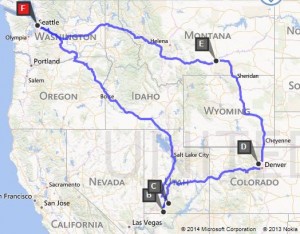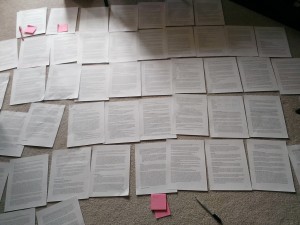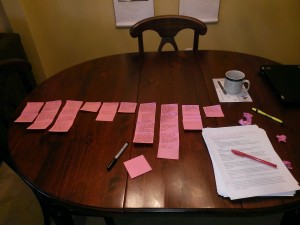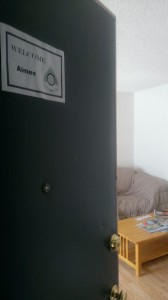Finding Your Passion is Overrated
![]() The whole “finding your passion” blitz is getting on my nerves. There’s an onslaught of books, classes, blogs and life coaches all telling us that there is a specific reason we’re on this Earth and we should be spending time and money figuring out what that is. In fact, if we’re not able to articulate our life’s passion in a mission statement format there’s something lacking in our lives and we’ll never be happy until we figure out what it is.
The whole “finding your passion” blitz is getting on my nerves. There’s an onslaught of books, classes, blogs and life coaches all telling us that there is a specific reason we’re on this Earth and we should be spending time and money figuring out what that is. In fact, if we’re not able to articulate our life’s passion in a mission statement format there’s something lacking in our lives and we’ll never be happy until we figure out what it is.
I met a life coach at a networking event a few weeks ago who seemed annoyed when I shared my thoughts on this topic. She informed me that her job was to help people find their passion whether it was their work or a hobby. “If you talk to someone long enough, you eventually find what lights them up,” she said.
OK, well that’s great if some people need helping figuring out what they’re interested in at $90 an hour. But I don’t need a coach to know that I light up talking about animal welfare issues. I’ll talk to you for a half-hour about what makes a good or bad sanctuary and then I want to stop talking about it and go on with my day. I like to visit sanctuaries and donate money to them and sign online petitions but I’m not compelled to do anything else about it. Maybe someday. Or maybe not.
When I conducted interviews for my book, I met people who are living their passion after quitting their corporate jobs. One woman’s most important hobby was scuba diving. She bought into an existing scuba business and now spends her work and leisure time on her favorite activity. I love those stories and think people who have a clear conviction about what they want to do with their time are fortunate to have a singular focus.
But I’d like to reassure the rest of us that there’s nothing wrong with our lives if we don’t have a specific calling. Maybe it’s more important to be happy, satisfied and at peace with our daily lives.
Don’t get me wrong, I’ve been an avid consumer of the “find your passion” type of book and class and coaching for years. Life coaches are a great resource for gaining clarity and taking action to increase satisfaction with our lives and I think that is more important than pursuing a validation for your life that you might never find.
Coaches are also helpful to overcome blocks. My sister, Kristen Sutich, is gifted at coaching me to feel at peace during difficult times and helps me make plans that sustain my goals. (She specializes in grief issues and helping moms send their kids to kindergarten, but I recommend her for general life coaching, too.)
I also took a tele-class this fall called “Find Your Calling Now”. It was led by Martha Beck who is my author-idol and whose books have inspired me for years. In the class, Beck talked about the Hero’s Journey, which the geeky writer in me loved, but in the end, I was nowhere closer to finding my life’s calling than before.
During the time period when I took the class, I was writing my book, working on a small startup company and spending a LOT of time wondering what the hell I was doing with my life. Even though I believed in the value of my projects and still do, they are not my life’s burning passion. I don’t jump out of bed at 5AM every morning because I’m filled with excitement to revise my book. My book is important to me but it isn’t magic. It takes energy and focus and discipline to work on it. It is similar with the startup business. The business model is compelling, but it doesn’t drive me.
At the present, I’m the happiest I’ve ever been with my work life. My main consulting gig provides interesting work that pays the bills, my clients are nice and I work from my home office. The freedom of doing my work in my own space is a huge part of my happiness. I make a healthy breakfast and lunch every day and can take a break to go for a walk from my own front door. I drive to the office for meetings and make a point of checking in with people when I’m there instead of taking for granted that I’ll see them each day. This arrangement also gives me the time and energy to work on my other projects outside of business hours.
 It took trial and error to get to this point. In some ways, my life resembles the one I had a year ago. I’m doing marketing for the same company that I left last June. I’m even in the same office complex – how weird is that?! But now I’m billing my hours from my home office as the owner of my own consulting company and that is a world of difference.
It took trial and error to get to this point. In some ways, my life resembles the one I had a year ago. I’m doing marketing for the same company that I left last June. I’m even in the same office complex – how weird is that?! But now I’m billing my hours from my home office as the owner of my own consulting company and that is a world of difference.
It is a satisfying feeling to look back at the week with gratitude because every day was a great day. Am I living my life’s passion? No. But I’m deeply happy. And that’s more than enough for me.
Sometimes The Outline Happens Last
I have been frustrated that I’m not making as much progress on my book as I wanted to. I finished the first draft in December and my goal was to revise it to the point where I could hand it off to a professional editor by the end of February. But it’s halfway through March and there’s a ton of rework to do before it’s ready for editing.
The biggest challenge I’ve had with the revision process is that the document hasn’t been well-organized. This book was born from a four-page outline that I wrote as a class assignment last July at the Jack Kerouac School. The outline describes what happens when people want to quit their jobs but feel stuck, talks about how to break through those barriers, and goes on to offer a plan for making an exit.
I still like that outline! But when I started writing the actual content I thought I needed to simplify it to three sections about timing, money and how to set yourself up for a positive experience after you’ve left your job. That format was easier for me to describe to people and seemed like a good container to fill. But I pretty quickly got into a bind when I wanted to write about topics that didn’t fit into either one of the outlines. At that point I was stuck for weeks and the only writing that happened was poetry and journaling.
Finally I gave myself permission to write whatever the hell I wanted to for my book. I had a running list of topics that I logged in a spreadsheet. When I sat down at my PC to write, I would either look at the list or just write whatever I felt like writing. I would open my word document, create a bold header for whatever the topic was about, and get to it.
On December 30th, the day that I finished my rough draft, I had an idea for a third outline based on steps that people could take to quit their jobs comfortably. I was thrilled with this last-minute inspiration because it sounded like something agents and publishers would go for. You know, “the seven steps to quit like a winner”. It has a great ring to it, don’t you think?
However, the more I reflected on it over the following weeks, I wasn’t sure those seven steps were really necessary, and there were topics I cared about that didn’t line up with this version of an outline either.
The problem I created for myself by adding section after section into my word document based on whatever I felt like writing each day was that there was no logical order. My draft was 100 pages of single spaced text and scrolling through page after page to find sections that seemed like they would fit together in chapters wasn’t working very well.
I thought that printing out the manuscript would help. I made a copy and started going through it with a red pen. But I sensed it was a wasted effort because I couldn’t see how the pieces connected to each other or the book as a whole.
I’d heard of authors spreading their manuscript pages on the floor and then walking around, sorting them. Maybe they have bigger living rooms than I do? I got about 50 pages down on the carpet before I ran out of room.
And there wasn’t enough space left for me to walk around and rearrange the papers, so I ended up walking on the paper, which made me feel like I was insulting myself. Milo, my cat, was confused at first and then he started walking on the papers, too. Cats are always happy to insult people.
Then I thought maybe it would be better if I got a pad of Post-its that I could write editing comments on and stick to the papers. Like, “move this section to the introduction.” I made a few notes, stuck them on the papers, and then Milo wanted to go out on the deck and a big gust of wind blew the papers all over. Enough of that.
But the notes gave me an idea. I wrote the different topics of the book on individual Post-its and saw patterns emerge. Before long I grouped each topic that I had written about into chapters, and moved the chapters into a logical order. They are now tidily laid out on my dining room table.
A bunch of pink Post-its might not seem like a big deal, but it is a big step towards making my book a reality. Now I can go back through the printed manuscript and re-order the pages to match the chapters, and then make revisions knowing how each topic flows into the next.
It would have been a much easier process if I could have written the book in order all the way from the introduction to the afterward. I love plans – planning is smart, saves time and helps get results. But that’s not how it went. Sometimes the outline happens last.
I Sold My Car But Not My Dream
I sold m y car last week. My shiny red Dodge Challenger that showed up when I quit my job.
y car last week. My shiny red Dodge Challenger that showed up when I quit my job.
After I quit, I drove this car down Washington State and across the corners of Oregon and Idaho, and all the way down Utah where I volunteered at the Best Friends Animal Society in Kanab for a few days. Then I drove up through Bryce Canyon and into Colorado to spend a magical month as a writing student in Boulder. When the month was over, I drove up through Wyoming and across Montana and Idaho, back to my home in Washington.
Each day when I got in my car for the next leg of my road trip, I started a playlist that I made for the journey. The first song was the theme from The Dukes of Hazard. “Straightenin’ the curves/ Flatnin’ the hills”….and neither the mountain nor the law got me in that car…not a single ticket or scrape. That car was with me on the best adventure of my life.
The Challenger symbolized the freedom and empowerment I felt when I quit my corporate job. It represented doing what I wanted to do, not what anyone else thought I should do. It was about making a choice not because it was practical but because it added fun and excitement to my life.
In the book I’m writing, I do not recommend quitting your job and then buying a new car! But I had enough savings to afford it and it was an acknowledgement of the confidence I felt. I believed in myself enough to quit my regular paycheck and go out on my own, knowing that I would be fine. My attitude was about saying yes to the possibilities.
It was so much fun to drive the Challenger on freeways and the open roads across the West. It was les s fun to drive in the cramped streets of Seattle, or to navigate around tight corners in parking garages. Challengers are wide cars with long hoods. This car didn’t fit in my garage at home and stayed in the driveway.
s fun to drive in the cramped streets of Seattle, or to navigate around tight corners in parking garages. Challengers are wide cars with long hoods. This car didn’t fit in my garage at home and stayed in the driveway.
In the summer and fall it was still more fun than frustrating. My schedule was wide open and I didn’t drive anywhere on most days. When I did, I could take extra time to find parking spots. Then I started a new consulting gig in January and suddenly needed to be at an office most mornings.
With the winter weather, I had to defrost the car to drive it to the office while my all wheel drive Subaru with its heated seats and rear windshield wipers was blocked behind it in the garage. I kept the Subaru when I bought the Challenger, expecting that it was going to be temporary. I didn’t like owning two cars; it clashed with my values of living more simply and with less consumption.
When the downsides outweighed the positive, I went to the AutoTrader website to evaluate how much the car was worth and found an option to get a price quote from local dealers who buy used cars. I plugged in the details and got an offer that was $900 less than what I purchased the car for back in June. I could take it to the dealership and skip the hassle of placing an ad, meeting people for test drives, and negotiating. It was so simple that I took it as a sign that it was time to let the Challenger go.
Last week I said good bye to the car. I felt like I was taking a beloved pet to find a new home. I had to remind myself that my best memories were from driving the car out to Boulder and back this summer, and that the car was a symbol of living more purposefully. It wasn’t actually freedom itself. I can still make empowering choices that make my life bigger and better.
bye to the car. I felt like I was taking a beloved pet to find a new home. I had to remind myself that my best memories were from driving the car out to Boulder and back this summer, and that the car was a symbol of living more purposefully. It wasn’t actually freedom itself. I can still make empowering choices that make my life bigger and better.
That car represented leaving old crap behind to start a new life, and doing something that was impractical but fun and just for me. I’m so glad I had that experience. And I’m glad I realize I don’t have to keep the car to continue to leave old crap behind, start new adventures, and do things just because they make life more fun.
How to Cope While Plotting to Escape Your Job
I’ve done a lot of research for the book I’m writing about people leaving their jobs to pursue more meaningful work. One of the most interesting things I learned was the various ways that people coped with their unpleasant work situations while they prepared to quit. Here are some of the top coping strategies I heard about:
On your drive into the office each morning, turn up the volume on your car stereo and blast any song that you can yell-sing along with. Repeat on your drive home.
Watch the 1975 movie “Rollerball”. In it, corporations rule the word instead of countries and individualism is squashed by the puppet masters. Marvel that the film is set in 2018.
Join a support group. AA, a church group, a Non-Violent Communications practice group. Anywhere where you are with trusted people that you can talk honestly about your situation. Or go to a counselor. Paying someone $100 to listen to you for an hour might be the best money you’re spending.
Change the settings on your smart phone so that your work email doesn’t automatically sync. Then make a point of not checking it after you’ve left work in the evening and not until you arrive at work the next day. And never on weekends. They have your cell phone number, right? If it is an emergency, they can call you.
Move the icon or tile for your work email to the very bottom of your smart phone, so you can’t see it unless you scroll down or navigate to another page. Psychologically this is a reminder that your workplace isn’t the most important part of your life. Put the higher priority icons or tiles at the top – your contacts, your calendar, your camera and pictures – you look at your phone multiple times a day so let it reinforce your values.
Put yourself first. Running late in the morning? Eat breakfast anyway. It’s your health and your energy. Feeling fatigued at the office? Take ten minutes to visit with a coworker or take a walk around your building. Don’t work at your desk during lunch unless you’re planning to leave work early to compensate. Go sit in the cafeteria and clear your head, go run an errand, or take a nap in your car.
Download a countdown app to your phone and set it for the day that you plan to give notice. Give the countdown a funny name that won’t tip off anyone at the office if they happen to see it. Like “lunch with Michael Scott” (a reference to the head Dunder Mifflin’s Scranton branch from the former tv series “The Office”). Or “Dilbert Festival”. Or “Day of Reckoning”. Every time you feel like screaming at your desk, take out your phone and look at your countdown.
Start taking home the things you care about from your office. Replace them with things you don’t care about, or facsimiles of what was there before. Like my friend who took home the photo he had on his wall but replaced it with a color photo copy.
At home, take an old cardboard box and write “This is the box I’m going to use to carry my stuff home from the office” on the inside with a black sharpie. Put it in your closet or the trunk of your car.
Then every day when you go into the office, smile at your subversive self.
Stepping Off the Treadmill of Ambition
I keep getting emails from Scott Dinsmore with his rallying cry question of “Are you all-in?”
No, I’m not. And I’m fine with that.
I’m editing and fine-tuning my book that I’m committed to publishing. I’m using a chunk of my savings and evenings working through a checklist of tasks to move my startup business forward. I’m spending the majority of my daytime hours on a consulting gig that I recently started, and am devoting energy into delivering top quality results for my client. I started this blog and a professional Facebook page to share my interest in the topic of meaningful work and connect with other people who want to live closer to their values. But I’m not all-in on any of this.
I’m not giving up my sleep, health, or social life because I put a higher value on my day-to-day happiness than launching my startup business faster. I’m not scheduling every half-hour of my week to maximize my productivity because it’s more important to me to have a certain amount of unstructured time. I’m not launching a professional Twitter account because I’d rather unplug from technology when I need a break and I don’t want to feel obligated to respond to tweets every few hours.
Maybe at some point I will turn more attention to these areas of my life, ramping up the hours and energy I spend on them. I might choose to be more active on social media to grow my businesses. Or I might let some activities go so that I can dedicate more effort to my highest priorities. But right now, my soul is guiding me to be a little easier on myself.
For most of my life my M.O. for success was to go all-in on every project I felt responsible for. I powered through when I was tired, sick, and when I’d rather be doing something else. This way of living started in high school, when I stayed up until 3AM if that’s what it took to complete a school project that was due the next day. Nobody encouraged me to do this – I felt compelled to turn in good assignments on time, in the same way that in my later working years I made sure that my deliverables met my bar of quality and met my deadlines.
Looking back at my career, I certainly produced a lot. When I think of the sheer volume of programs, projects, presentations, and materials that I generated in any given year, I feel more surprised than proud, because it seems like I delivered an unrealistic workload. Which is part of the problem that I’ve read and heard about so much in my book research – and I didn’t have to look very far to find it. Company employees are continuously being asked to do more with less. Layoffs happen, budgets are reduced, and the remaining employees don’t just pick up the slack – they work to continue to grow the business. Just today I had a conversation with a woman who often works until 10PM because she’s responsible for the equivalent of two full-time jobs. Like many of us, she feels compelled to give it her best effort, but she also acknowledges that it’s not how she wants to live her life.
When I lived this way it felt like I was plugged into a corporate machine. I was running on adrenaline and there was no way to shut it off. I went from working a bunch of hours in a stress-filled office to coming home late and tuning out until it was time to sleep. And I needed a lot of sleep to be able to get through the days. I know not everyone operates like this, and there are people who can leave work at work, or check out and stop caring, or find other ways to cope. I saw it all: people coping with prescription meds, booze, drugs, or by acting out.
I didn’t want to just cope; I wanted to enjoy my life every day. When I quit my job, I stepped off the treadmill. Life slowed down so much that it was a shocking adjustment to have plenty of energy and many more hours in each day than what was required to work on my book and new business. When you’re used to running at 60 MPH, walking takes some getting used to.
I’m not the only one. I read an article on Tiny Buddha by Joe Scherrer, who wrote about what it was like to step off the treadmill of ambition. In his case, it was a two-month vacation that flushed the adrenaline out of his system and showed him that there is another way of life besides striving for success all of the time. After that experience, he didn’t want to go back to a lifestyle of constantly pushing to get ahead.
I also loved reading Tara Sophia Mohr’s blog post that offers a different perspective on what successful people do before breakfast. There is so much “GO, GO, GO” pressure in American business. Being productive is a need, but it isn’t the only need. Having calm, rest, and pleasure are also needs and they are just as valid.
As much as I like Scott Dinsmore’s advice about how to live up to our dreams, I’m not going all-in at this time. So if I take a weekend off instead of posting on my professional Facebook page or going to a networking event, I get it if some people think I’m not taking the right steps to advance my goals. But I’ve had enough of running the treadmill. This time I’m walking.
It’s Not Just Time. It’s Also Energy.
I hear this all the time and you probably do, too: “I don’t have time.” It’s often the first response or excuse we think of when we don’t want to do something or think it isn’t possible.
I grew up writing stories and poems. I enjoyed it. I majored in English in college and when I wasn’t writing essays or creative pieces for school assignments, I would also write for myself. That practice continued long after I graduated. I had notebooks and PC word docs filled with stories and ideas that I created in the evenings after work or on weekends.
But as years went by I began working longer, more stressful hours at my job and writing for fun slowed down. And then stopped. I didn’t write for eight years.
Certainly the more hours I spent working meant fewer hours left for myself, but what was worse than the lack of time was the lack of energy. I was tired in every sense: physically, mentally, emotionally, and spiritually. My free time became about recovery, not about hobbies, having fun, and spending time with people. I needed a lot of sleep just to be able to get back up the next day or the next Monday and go to work again.
My mind and energy were so consumed by work that I didn’t have the brain-space for creative ideas. Then about the same time that I decided to quit my job, I started thinking of stories again and wanted to write about them.
One evening I dreamt a fully formed story that included a solid plot, and wrote it down as soon as I woke. As I got in bed another evening, I had an idea for a children’s book. I got out my notebook and started writing. Four hours later, I had the entire story on paper.
Other times a melody and a few words would appear in my mind and within minutes I had a page of lyrics with the musical notes that I guessed at.
Once I made up my mind to quit, energy flowed back into the parts of myself that had been neglected for too long. Becoming consumed by work robbed my creativity and self-expression. Unplugging from the corporate treadmill brought it back.
I was still working full days while I planned my departure, but my life-force was directed towards creating a healthy, happy, meaningful existence. The hours between work and sleep now had the potential to work on creative projects. When I shifted my priorities, my entire life shifted.
Savings = Options
One of the most common questions I get when people hear that I quit my corporate job is about how I was able to do it financially. As someone put it delicately the other day, “Isn’t it uncomfortable not having an income?” Well, yes it’s uncomfortable! Seeing all of the money go out of the checking account instead of coming in doesn’t generate feelings of comfort. I take deep breaths and remind myself that this was the plan. This is what I saved for.
Well, to be accurate, I saved for this scenario; the possibility that I would be living off of my savings for an extended period of time. When I first decided to leave my job, nearly a year before I actually left, I planned to start a business. I did research, took training, talked to people in my chosen field, and had a marketing strategy lined up. But as I neared my exit date a different business opportunity came up that I was even more excited about and I turned my attention in that direction. And yet another idea was born during the month I spent at a summer writing program – I formed a solid outline of a book I wanted to write.
By August the new plan was to work on the startup and write my book, and ideally generate income from both starting January 2014. Soon it became clear that the startup and the book were on the slow track and as I learned more about both industries, I realized that neither one were going to provide a living wage anytime soon, if ever. But I was committed. I had a solid start to a book and an interesting new business and wanted to see how much I could do with both of them. Plan V4 was to treat these efforts like full-time jobs and then amp up consulting in 2014. Thankfully I had saved enough money to make this option possible.
I’ve always been a saver but once I made up my mind that I would leave my job, I doubled-down. I got rid of my home phone and cut cable down to the cheapest plan possible. I would have scrapped cable TV altogether but my internet bill was less expensive bundled with TV than without. I stopped buying things. I didn’t shop for clothes and if there was something I saw that I thought I’d like to have, like a kitchen gadget, I just didn’t buy it. I became fond of the saying, “Use it up, wear it out, make it do, or do without.” My one remaining consumer habit was cosmetics. I have a “thing” for shopping at Sephora and long after I stopped buying other stuff I didn’t need, I was still purchasing lipstick and eyeliner. Eventually even that fell away. When I passed up the holiday coupon for $25 off a purchase of $50 or more, I knew I’d transcended.
Alison Green of the blog www.askamanager.org wrote about the choices that savings provides in a 2011 post titled “3 Things I Learned by Quitting my Job in a Recession”. She wrote, “I wanted to quit my job and work for myself for a lot of reasons. I was able to quit my job and work for myself for this reason: savings. Having savings lets you act from strength, not desperation. That has huge ramifications for the decisions you’re able to make and, therefore, for your quality of life.”
If you are considering a career change, maybe this New Year is the right time to make a resolution to save extra money so that you’ll have more options. A great place to start is by finding out how much you really spend, which is probably more than you think. A fellow career-changer, Jennifer Lesher, told me about www.mint.com. It’s the best budgeting tool I’ve seen so far. It sucks your online financial data into a dashboard where you can see your total spending by category (household, auto, insurance, food, etc.).
While it doesn’t feel comfortable to make a career change that involves financial risk, it is liberating to be able to choose. I’m happy with my choice.
I Quit My Job and the Universe Approved
I’m a practical person. When I decided to quit my corporate job, I was methodical in my process. I made a plan to start my own business. I created checklists of tasks to prepare financially and to complete major milestones at work. I thought it would take about nine months to cross the last item off my list and then I would quit.
As I got closer and closer to the end of my list, I became happier and happier. I reclaimed my power. I was no longer afraid of layoffs or being penalized for speaking up for myself and what was right for the business. I mean, what were they going to do, fire me? Then I would have been eligible for unemployment benefits, so I felt like I couldn’t lose.
I wanted do something significant right after quitting and before diving back into business since it might be the only time in my working life between full-time jobs. I liked writing and decided to enroll in Naropa University’s Summer Writing Program, whose version of an English department is called The Jack Kerouac School of Disembodied Poetics. Perfect. I started reading Kerouac’s On the Road and downloaded a countdown app to my smartphone to mark the days until I “hit the road with Jack”.
Then it was time to put in my notice, say my goodbyes, and start my new life. I was on fire! I felt like a bird that had been freed from a cage that it didn’t even know it was in. Events fell into place so smoothly that a divine presence seemed to be guiding my way. For example, I think I manifested a Dodge Challenger. Really. I don’t care very much about cars, but thought the General Lee from the Dukes of Hazard was cool. I had to take my Subaru into the repair shop for a few days, and asked the rental agency if they had any Challengers to loan. And they did. What are the odds? Usually they only allow requests for the class of car, but this time I got the exact make and model that I wanted: a shiny, red, 2013 Challenger.
I thought it would be fun for a few days and then I’d go back to my practical Subaru. But this muscle car symbolized the excitement I felt about the potential my future held – and it was really fun to drive. So I looked around for used Challengers and didn’t find any in my price range. But I did find the exact car that I was driving advertised as a loss leader at the dealership nearest me. The one car I wanted was on sale. And now it’s mine!
My entire summer was like this – just magical. On the drive to Colorado, I’d stop at a motel for the night and the receptionist would tell me, “Oh, we only have a suite left. But I can give it to you for the price of our standard room.” Or the café would make too much chai and give me an extra cup for free.
Once I arrived at Naropa, I loved my classes, my student apartment, Boulder, and the talented new friends I made. The Beat poet’s experimental approach was liberating and my creativity exploded with ideas for poetry and non-fiction. One class assignment was to write the outline for a book, which became the basis for my self-help manuscript that is now a 50,000 page rough draft.
Once I decided to leave my job, it was as if the Universe said, “Yes, this is the path you are supposed to be on.” Life became easy and fun in ways that I hadn’t experienced before. Since then, I’ve had ups and downs adjusting to a radically changed lifestyle. But now I know what it feels like to be in the flow of life and am constantly making adjustments to stay where the magic is. The Universe approves.
Welcome to Truth and Details!
Knowing what is true for me and how I claim it are priorities in my life. I’ve always had a streak of advocacy in me. When I was five years old, I wrote a letter to petition the principal of my elementary school to allow kindergartners to have chocolate milk on Fridays because the other grades did. My reasoning was based on fairness. He concurred, and I’ve been fond of chocolate milk and speaking up for what I believe in ever since.
Speaking the truth isn’t always popular no matter how politely it is phrased. I’ve been disappointed by how frequently honest communication is shunned out of fear or the desire to keep the same broken systems in place. It also isn’t always easy. Sometimes the consequences are painful and self-preservation or protecting others overrules. Even in those cases, I’d rather be honest with myself about my choices.
This site is about sharing my truth and details and the wisdom I’m learning from others to live a more meaningful life. Join me?






Recent Comments